Virtual Book Club: Meet Kathy Shuker
On That Still and Whispering Place
Virtual Book Club is back after a short autumn break and today I’m delighted to welcome Kathy Shuker, who would like to persuade your book club to read her new release, That Still and Whispering Place. (Even the title gives me shivers.) If you would like to pose a question of your own, you’ll have the opportunity to do so at the end.
Kathy grew up in the north-west of England and trained as a physiotherapist but had to give the work up early in her career due to a back injury. Subsequently studying design, she worked as a freelance artist, painting in oils and watercolours, exhibiting, supplying galleries and teaching. Always a keen reader, she started writing some years ago and has now published three novels: Deep Water, Thin Ice, a mystery set in Devon, England; Silent Faces, Painted Ghosts, set in Provence in the south of France and, just released, That Still and Whispering Place, an atmospheric mystery surrounding the disappearance of a young girl.
Q: The protagonist in your latest novel is Claire Pennyman. What five words best describe her?
Early in the book, her sister-in-law remembers Claire as a child: she was enthusiastic, funny, stubborn, independent and awkward. Brave even. Now that Claire has returned to the village where she grew up, everyone wonders – after the loss of a daughter and her ongoing divorce – if she’s changed. Claire wonders too. It’s one of the themes running through the story: how much of our character is fixed; how much is mutable.
Q: Where is the book set and how did you decide on its setting?
That Still and Whispering Place is set in Cornwall in the southwest of England, the neighbouring county to where I live. I know it well. It’s a beautiful region, famous for its stunning coastline and beaches, but with a range of striking inland areas too, from moor to verdant valley. There’s an area in the southeast of the county where several waterways wind their way through to the River Fowey. It’s green and sheltered and remote. It felt right for the story. And then I decided that the cyclic cultivation and rhythms of a vineyard would make the perfect backdrop to it. (There are a lot of successful vineyards in the south of England now, many in the southwest.) I imagined a small, rural, insular village, but also a place that was busy in the summer with tourists. Bohenna was born: a pretty riverside community, dominated by a family-run vineyard, with dark undercurrents of family dissension, confused friendships and old rivalries. Against this setting, a child disappears and, despite the smallness of the place, no-one knows how.
Q: Tell us a little about the major areas you had to research
Wine-making! It wasn’t a struggle. I have made a little wine myself, years ago (with mixed results), but I had no idea about commercial cultivation. So I visited a number of vineyards both in the southwest and further afield. Not only do they make some wonderful wines, most vineyards also offer tours of the vines and their wineries, explaining the processes involved. It proved a fascinating experience and very educational. Inevitably there are some differences of approach but they were all universally enthusiastic and passionate about what they did. I’m grateful to them all for sharing their knowledge so willingly. I look at a glass of wine with more respect now.
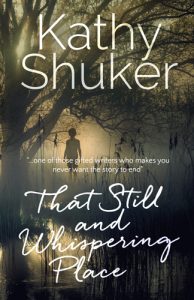
Click here to look inside or buy.
‘After reading three of her books, I’ve come to the simple conclusion that Kathy Shuker is just a really fine storyteller!’
Q: At what point in writing the book did you come up with its title?
Quite early on. I usually fret over the title for months but, as soon as I formed the image of Bohenna – the quiet, misty Cornish village and its gossiping residents – the title seemed to create itself.
Q: What is it about your novel that you feel makes it particularly suitable for book clubs?
Though a mystery, it’s a multi-layered story with serious moral and relationship issues and vivid characters. I think it could throw up some interesting discussions about those issues and about the reactions of the different characters to them.
Q: Are you looking to entertain or illuminate your readers?
My first reaction is to say: entertain. I don’t think I’m in a position to illuminate. My novels are driven forward by a central mystery but the stories are character-driven so, as they unfold, I examine human relationships too, what makes them tick and what makes them go wrong. Perhaps ‘entertain’ sounds too frivolous. I cover serious issues and I have no answers but by trying to create believable people, by following their passions and decisions, I suppose I try to make some sense of it for myself. At the end of the day however, it’s a story. I hope my readers can leave their own busy lives behind for a while, engage with the characters and immerse themselves in the narrative. I see that one definition of ‘entertain’ is ‘to hold in the mind’. I like that.
Q: How does your home and its environment influence your writing?
I have lived in small rural communities most of my adult life, enjoying visiting big cities and bustling places but always happy to return to my quiet life. I think my village home has two effects: I find it easier to write where it’s quiet with no distractions other than the sounds of farming life and the birds in the garden; my stories tend to take place predominantly in rural places, places I know.
Q: What do you think the advantages of writing in the third person are?
I prefer to weave my stories from three or sometimes four points of view. They are carefully – and I hope, clearly – separated, but I think it gives the stories more depth, more insight. It can also be used to add to the mystery. People don’t always admit the truth to themselves, let alone to their friends and family.
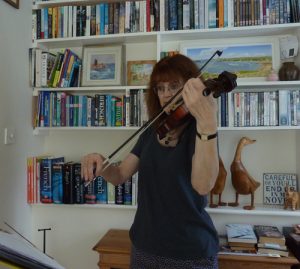
Q: According to F. Scott Fitzgerald, a novel is never really finished but only abandoned. True?
I think so. I get to a point where I have to let it go. As it is, I take the better part of two years to write a novel and I could keep agonising over it for ever. But it’s like painting a picture: you always think you should be able to make it perfect but you can’t, and too much work can spoil its creative edge.
Q: What’s your favourite/least favourite aspect of writing life?
I love creating characters and inhabiting a different world. It’s the ultimate escapism. I’m also fascinated by language and the depth of nuance that can be achieved by it, sometimes with remarkably few words. And I relish the challenge of creating a story and sub-plots, making them all mesh together, drawing them through to a satisfying conclusion. The hard part is telling everyone about it afterwards. Like most writers, I’m not comfortable with marketing my own work. But if I want people to read it… Compared to what some people have to do in their jobs, it seems petty to complain about it!
Q: Where can we find out more about you and your work?
You can visit my website and find me on Facebook or Goodreads.
*****
Remember, if you enjoyed this post please share it. If there’s anything else you’d like to ask Kathy please leave a comment.
To have future posts delivered directly to your in-box, visit the sidebar on the right and subscribe to my blog, or to find out about new releases, competitions and freebies, subscribe to my newsletter and grab your free copy of my novel, I Stopped Time.
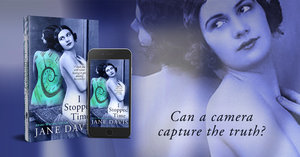
You might also like to enter my Goodreads Giveaway to win a copy of My Counterfeit Self.
Goodreads Book Giveaway
My Counterfeit Self
by Jane Davis
Giveaway ends November 12, 2016.
See the giveaway details
at Goodreads.
And if you’re an author and would like to appear on Virtual Book Club, please fill in a contact form.

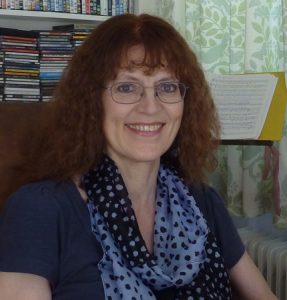
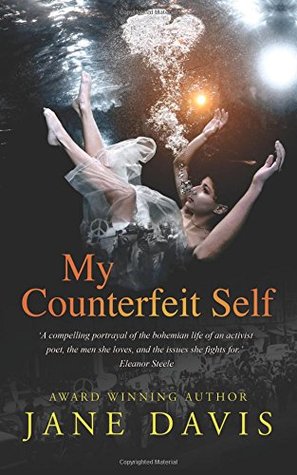

3 comments
Interesting interview with Jane Davis, particularly on the focus that village life offers to interactions and characters. Love your book covers!
A big thank you, Jane, for hosting this interview. It was a pleasing challenge to answer your original and thought-provoking questions.
Your descriptions of the setting sold the book to me.